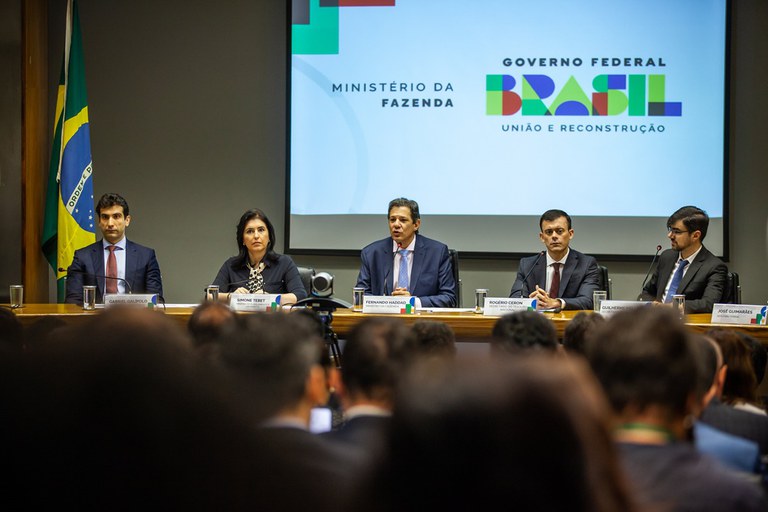Notícias
FINANCE
Brazil’s new fiscal rules include the poorest in the government budget and foresee a surplus for 2025

Foto: Diogo Zacarias / Min. Fazenda
The rules of Brazil’s new fiscal framework – announced today by the Minister of Finance Fernando Haddad – will allow the country to attract investments and resume sustainable growth with stability and predictability, while implementing policies to combat hunger and advance social reparation.
The spending cap is being replaced by a rule that remedies what we’ve identified as deficiencies in the former rules. This is a real possibility of creating a solid tax base. When the problem’s solved, there’ll be a new horizon for economic and social development”
Fernando Haddad, Brazil’s Minister of Finance
According to Haddad, the measures will allow the government to put into practice what President Luiz Inácio Lula da Silva has determined: that the poorest be included in the budget, and the richest placed within the reach of income tax. The set of rules are focused on reducing inflation; on encouraging private investment; and on ensuring increasing national and international investment.
With the new fiscal framework, the government intends to zero out the fiscal deficit in 2024; to have a 0.5% surplus in 2025; and a 1% surplus in 2026. The surplus is the positive result of government revenue minus its expenditure, not counting interest payments.
To achieve this goal, the government plans to balance public accounts by limiting spending to 70% of the growth in revenue reported in the previous 12 months. According to Haddad, this measure will correct the former fiscal rules’ deficiencies and ensure Brazil’s financial sustainability.
“The spending cap is now being replaced by a rule that remedies what we’ve identified as deficiencies in the former rules. (...) This is a real possibility of creating a solid tax base. When the problem’s solved, there’ll be a new horizon for economic and social development,” said Haddad during a press conference at the Ministry of Finance in Brazilian capital Brasília. According to the minister, these measures are not a “silver bullet”, but the beginning of a journey, of a flight plan to fix the Brazilian economy.
Brazil’s Minister of Planning Simone Tebet said she considers the new fiscal framework credible. “Concerning the budget, I can say that – after checking the first numbers – the new fiscal rules are credible. They’re feasible, and we’re capable of meeting the established goals. And why is that? Because they’re flexible; they include bands and give us room for self-correction. From the perspective of planning and budgeting, we’re feeling absolutely confident,” said Tebet. The minister also stressed that public accounts and the welfare of society must be equally important goals.
The new fiscal rules were presented alongside three Finance secretaries: Gabriel Galípolo (Executive), Rogério Ceron (National Treasury) and Guilherme Mello (Economic Policy). The text is to be sent to the National Congress next week.
ADJUSTMENT MECHANISM – The new fiscal framework allows for self-correcting, thus helping the government to deal with negative situations and reduce public debt. The fact that the increase in expenditure is limited to 70% of the increase in revenue – the calculation base is the 2022 budget – in itself ensures revenue savings that drop the deficit to zero in 2024.
Instead of a spending cap, there is a band mechanism with real growth in primary spending between 0.6% and 2.5%; this is called a countercyclical movement. In any crisis situation, it cannot be less than 0.6%. When revenue increases, it is limited to 2.5%. FUNDEB and the nursing salary floor were left out of these limits.
“You have to make reserves during good phases and then use them in bad phases – never allowing the state to become disorganized. You have to offer security to businesspersons who want to invest and to families who need state support for essential services,” said Haddad.
TAX REFORM - According to the minister, the solution that is being proposed goes hand in hand with tax reform – another of Brazil’s priority projects. No new taxes are expected to be created, nor existing taxes increased – but a fairer and more efficient model will hopefully be established to correct the distortions that keep many people outside the tax system.
“I remember what President Lula said during his campaign: we have to include the poor in the budget and the rich in the income tax. We have to make those who don't pay taxes, pay. Many sectors are favored by rules that were created decades ago and have never been reviewed. Many have expired in terms of efficiency and must be revoked. Over this year we’re going to send healing measures to Parliament to render the results of this announcement even more consistent.”
Haddad highlighted the need to combat patrimonialism and put an end to any abuse and jabutis (in Brazil, amendments that modify a bill under discussion in order to change or distort its original objective) that make the Brazilian tax system so confusing. “If those who don’t pay any taxes begin doing so, we’ll all have to pay less interest. So those who are outside the system must be included in it,” he said. The minister also added that the government will work hard to ensure that any actions to recompose the tax base that are pending in the Federal Supreme Court (Supremo Tribunal Federal) are decided upon as soon as possible. The recomposition, he said, will allow the Executive Power to carry out its programs while attending to the demands of society.

